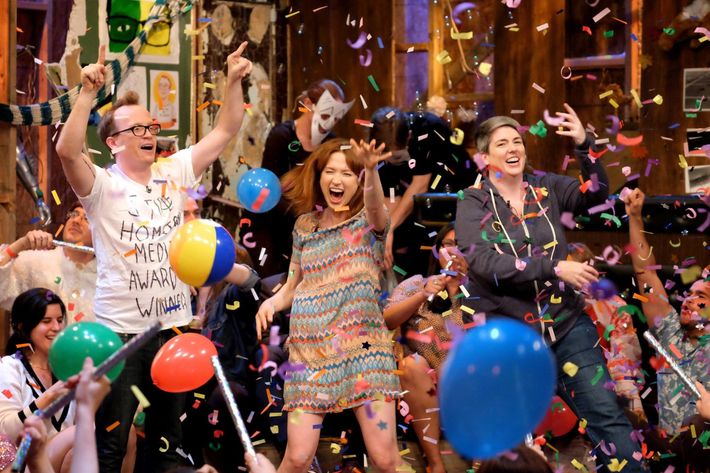
The single most enjoyable hour of TV I experienced this year was built on the simplest of premises: Can someone, anyone, guess what’s in this Dumpster? That was it.
It was the concept of the ninth episode of the second season of The Chris Gethard Show on Fusion. Nothing else happened the entire episode except that. People called or Skyped in and guessed (incorrectly) what was in a Dumpster. People in the studio audience guessed as well. Otherwise, there was nothing but waiting and joking about the waiting and the nothing.
If you want to go into the episode completely unspoiled, which I support, watch it below now. In general, I’m just going to reveal two things about the Dumpster: (1) The category of thing in it, and (2) if the contents were eventually revealed.
Now, part of the pure joy of it comes from guests Paul Scheer and Jason Mantzoukas and from the reveal of who is in the Dumpster. But much of it came from knowing, as a person who has followed his career, that this episode was the culmination of everything Chris Gethard has been working towards.
As Gethard told me in a recent conversation, “Friends of mine have said, ‘You were this cautionary tale for a while.’” For longer explanations of why this is, read this and this, but in short: Gethard was an improv prodigy of sorts, quickly rising in the ranks at the UCB Theatre when it was first making a name for itself. He was mixing it up with the big dogs, people who are now household names, or at minimum, names at comedy nerd households: Amy Poehler, Mantzoukas, Scheer, Jack McBrayer, Rob Corddry, and so on. Soon all those people moved on to bigger and better, or at least to L.A. Most notably, his two best friends in the program, two guys who were on his improv team, Bobby Moynihan and Zach Woods, got their big breaks (Saturday Night Live and The Office). Gethard was supposed to be next in line, but over and over, younger and younger comedians passed him.
He finally got a medium break, co-starring on the Comedy Central sitcom Big Lake, but it was swiftly canceled. With dreams of Hollywood stardom dashed, he went smaller, creating The Chris Gethard Show, first as a live show at UCB and eventually on public access. There the show earned a cult following, but the sort of cult following that some onlookers in the scene viewed as death. That was the cautionary tale: The comedian who never moves to L.A. and becomes content with cult success and indie cred to a point that he self-sabotages any potential to “make it.” To his doubters, which included some of his friends and collaborators, Gethard turned down a stable career in comedy for this — a public-access show that even he admits was hit or miss.
“There were times where the only people who believed that the show could turn into something were the people involved in it,” he told me, before correcting himself. “Actually, even some of the people who are at the core of it have had some crises of faith. It’s probably a half dozen people who believed in it from the start to now.” This, of course, extended to production companies and networks, including Conan O’Brien’s Conaco, who thought what he was doing was cool, but not something they could do anything with.
Finally, in 2015 Gethard found a home at Fusion, but even they didn’t totally get it. Gethard told me their response to the first season was a bit befuddled: “How does this fit what we do?” That’s partly because the first season wasn’t exactly right. It was like a cropped, resized, and overly Photoshopped version of the original. The show went from an extremely, extremely, exxxtremely loose hour on cable access — known for peaks and valleys — to a tightly edited, entertaining half-hour TV show. It was good, but definitely not special, and definitely not something worth sacrificing as long as he did for. Fusion gave him a second season and in response he told them, admittedly arrogantly, “You have to let it be what I want it to be.”
Which brings us back to the Dumpster. Gethard starts the episode by saying, “I am very, very happy because we’re about to do, I think, the dumbest show we’ve done in years.” He continues, laying out the rules, “One, if you don’t guess, I’m wheeling this thing out of here and you’ll never get to see it. And two, if you guess right away, we have no backup plan.”
As I said, that’s it. You should watch it, all of it, without reading the comments or skipping to the end. It is worth it. Not only for the reveal, but because for the 40 or so minutes in between, you’ll see exactly the world that Gethard has been building for years.
TCGS was always a clubhouse, but one that spoke in its own sort of comedic pig Latin that mostly only made sense to those inside it. “One Man’s Trash,” as it is officially called, is the Rosetta Stone. As people call in from around the world, it captures the sense of community — in particular an earnest community willing to join in on anything — that Gethard has built. Also, the episode is about TCGS’s signature balance between control and chaos. TCGS is essentially a show of putting Gethard in situations — often with a set of specific ground rules, whether it be getting to Bonnaroo just by hitchhiking, or hanging upside down as a human crane — and being totally willing to have the result be awkward or scary or funny or boring. The beauty of it is in the hope that things will go right, in the face of things almost certainly going wrong. When you watch 40 minutes of Gethard being unsure, nervous, and excited about whether anyone is going to guess, only to see who it is, you’ll get it — and you won’t have been the only one.
“People I haven’t met before are like, ‘Blah blah blah told me to watch that episode of your show and I get it now,’” Gethard told me. Talking to other comedians, he said, it was this episode where they were like, “Yup, that.” A Dumpster might be a tiny, enclosed space, but something about it invited people in and helped them put a finger on what is special about TCGS.
The episode came out four months ago, and I can tell you as a person who has known Gethard tangentially for almost five years, it has changed him. “I feel there’s this monkey off my back,” he told me. “I have that to point to, and say, ‘That’s why I didn’t give up. That’s why I put everything by the wayside.’” He knows it’s silly, but Gethard found hope in a loveless place — a Dumpster. “It’s such a dumb thing to say, ‘We had a person in a Dumpster for an hour, but that’s what I’ve always been aiming for.’” If the show gets a third season, which he is confident it will, it will set the bar. “The rallying cry is gonna be,” he told me, “can every episode be better than the Dumpster episode?”
Chris Gethard is currently performing his one-man show, Career Suicide, at the Lynn Redgrave Theater, through January 8.






